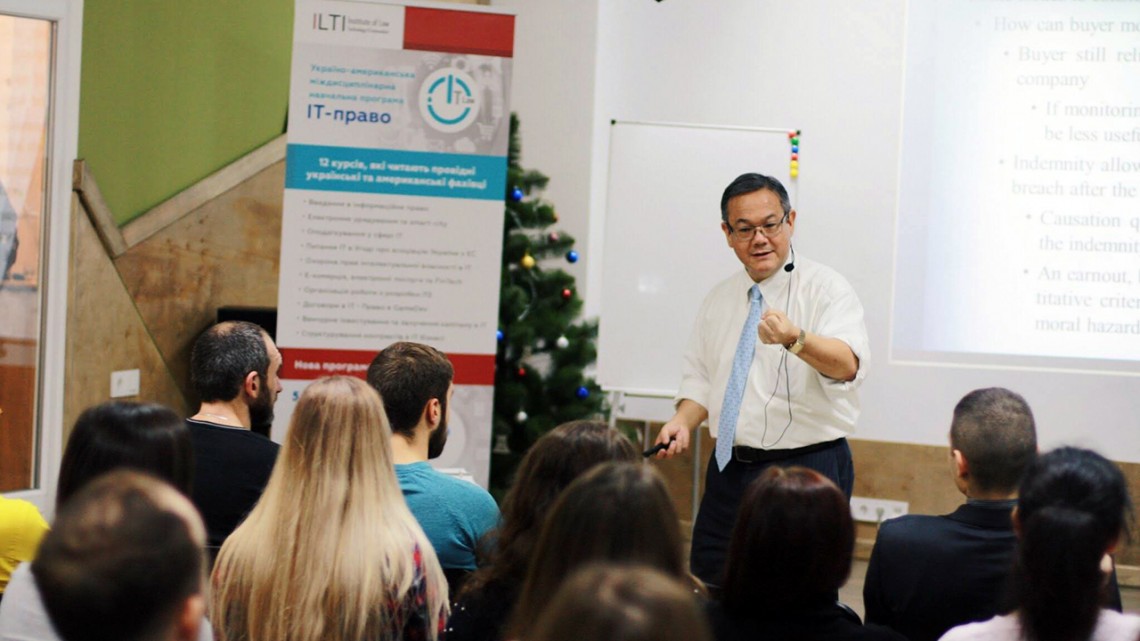
Charles Whitehead gives a lecture at Ukraine’s Hardware Day Competition last year. The winners got to represent Ukraine at the global Consumer Electronics Show in January in Las Vegas.
Law School professor promotes Ukrainian tech startups
By Kathy Hovis
Cornell Law School professor Charles Whitehead has launched a venture to help boost tech startups in Ukraine, focusing initially on the two largest cities in the country.
Whitehead, the Myron C. Taylor Alumni Professor of Business Law at Cornell Law School and founding director of the Law, Technology and Entrepreneurship Program at Cornell Tech, has been lecturing at Ukrainian universities, speaking at national and global conferences in Kyiv (formerly known as Kiev) and Kharkiv, and advising Ukrainian government officials for the past four years.
“Kyiv has a dynamic tech and startup environment, but limited global exposure. Kharkiv is even less well-known,” Whitehead said. “It was nicknamed ‘Science City’ in the former Soviet Union, being one of the country’s principal academic centers, with more than 100 universities, research institutes and colleges, and roughly 200,000 students.
“There are a lot of smart people in Ukraine with great ideas,” he said, “and a wealth of untapped technology, but little business expertise.”
According to Whitehead, incubated businesses will receive low- or no-cost help from Ukrainian and non-Ukrainian mentors in areas such as law, strategy, human resources, accounting, business planning and marketing. The incubator launched in April at America House in Kyiv, an organization offering resources for American culture, education and innovation funded by the U.S. State Department.
“Ukraine needs to attract new capital, so a platform that can support new business at a global level is critical,” Whitehead said. “Doing so will help impose a discipline on business and finance in Ukraine – perhaps one way in which market forces can combat the corruption and weak law enforcement that exists today. In other words, introducing an open market will support new laws that facilitate growth in that market.
“Creating a U.S.-style incubator with mentors who have real business experience is an important part of the equation,” said Whitehead, adding that he has recruited a team of mentors from Ukraine, as well as the United States, Israel, the United Arab Emirates and the U.K.
“I can say, with real certainty, that this project has the potential to be transformative for Ukraine,” said Eduard Simson, chairman of the Sub-committee for Innovations and Startups of the Ukrainian Prime Minister’s National Committee on Industrial Development. “Not only will it launch new businesses, it will act as a model in Ukraine for how a global, market-based system should operate.”
Whitehead said he chose Ukraine, a country that’s been independent for 27 years, because of the opportunity it presents to introduce a market-based system into an economy that had been centrally planned.
“A platform for new business is something the country needs,” he said. “It remains to be seen whether the rigors of a market discipline will cure the significant legal and other problems that have plagued Ukraine in recent years.”
Whitehead traveled to Ukraine over the past two years to set up the incubators, but Eastern Europe isn’t new to him. As a boy, he lived in the Soviet Union for two years while his father was at the U.S. Embassy, and he visited Ukraine at that time. Whitehead was the first American to attend Artek, the premier Young Pioneer camp in the former Soviet Union.
Whitehead accepted an invitation in 2014 to lecture at Yaroslav Mudryi National Law University, one of the top law faculties in the former Soviet Union and in Ukraine today, and continued to visit and lecture, including on a Fulbright grant. He eventually became the fifth person, and only American, to receive an honorary doctorate from that university.
Kathy Hovis is a writer for the College of Arts and Sciences.
Media Contact
Get Cornell news delivered right to your inbox.
Subscribe
